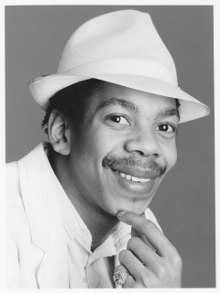Smiley Culture facts for kids
Quick facts for kids
Smiley Culture
|
|
|---|---|

Mid-1980s publicity photo
|
|
| Born |
David Victor Emmanuel
10 February 1963 South London, England
|
| Died | 15 March 2011 (aged 48) Warlingham, Surrey, England
|
| Occupation | Singer, deejay, television presenter |
| Musical career | |
| Genres | Reggae, dancehall |
| Instruments | Vocals |
| Years active | Late 1970s–early 1990s |
| Labels | Fashion, Polydor |
David Victor Emmanuel (born 10 February 1963 – died 15 March 2011), known as Smiley Culture, was a British reggae singer and DJ. He was famous for his "fast chat" style of singing. During his time in music, he created two popular reggae songs in the 1980s. He passed away on 15 March 2011, at the age of 48.
Contents
Who Was Smiley Culture?
David Emmanuel grew up in Stockwell, south London. His father was from Jamaica, and his mother was from Guyana. He went to Tulse Hill School. He got the nickname "Smiley" because he would ask girls at school for a smile.
Before he became a recording artist, he worked as a DJ. He played music with many sound systems in London. He often worked with the Saxon Studio International system. There, he met other reggae artists like Maxi Priest and Tippa Irie.
Music Career and Hit Songs
Smiley Culture signed with Fashion Records, a reggae music label in London. His first song, "Cockney Translation" (1984), was a guide to the East End dialect. It mixed Cockney words with London's version of Jamaican patois. The song showed how different languages can blend together. It was even used in schools to teach about how immigration affects the English language.
Smiley Culture helped make the "fast chat" style of deejaying popular. This style started with Jamaican DJs and was further developed by British artists.
His next song, "Police Officer," became a big hit in late 1984. It reached the Top 20 in the music charts and sold many copies. This success led to him appearing on the TV show Top of the Pops twice. The song was funny but also pointed out how black people were sometimes treated unfairly by the police.
In 1985, he performed at the Reggae Sunsplash festival in Jamaica. After this, he signed with a major record label, Polydor. He released an album called Tongue in Cheek. He also hosted a TV show called Club Mix in 1986 and 1987.
Other Appearances and Influence
In 1986, Smiley Culture had a small role in the movie Absolute Beginners. He also appeared in a TV ad for NatWest bank.
Later black British musicians, like DJ Luck and MC Neat and Roots Manuva, have said that Smiley Culture influenced their music. Roots Manuva called him a "Britrap pioneer." The song "Cockney Translation" was even chosen by author Michael Rosen on the radio show Desert Island Discs.
In 2010, Smiley Culture shared that he had started investing in diamond mining. He had mining rights in several countries, including Ghana and Uganda.
Smiley Culture's Passing
On 15 March 2011, David Emmanuel died at his home in Warlingham, Surrey. This happened while police officers were searching his house. An investigation was carried out by the Independent Police Complaints Commission. They looked into the events surrounding his death.
The investigation concluded that there was no evidence to charge any of the officers with a crime. However, the report also noted some issues with the police search. Smiley Culture's family expressed concerns about the investigation. His death also led to public discussions about how black people are treated by the police. It was seen by some as a factor in the 2011 United Kingdom riots.
Discography
Albums
- Tongue in Cheek (1986), Polydor
- The Original Smiley Culture (1986), Top Notch
- Contributing artist
- The Rough Guide to Reggae (1997), World Music Network
Singles
- "Cockney Translation" (1984), Arthur Daley International/Fashion
- "Police Officer" (1984), Fashion – UK No. 12
- "Cockney Translation" (re-issue) (1985), Fashion – UK No. 71
- "Schooltime Chronicle" (1986), Polydor – UK No. 59
- "Mr. Kidnapper" (1986), Polydor
- "So What" (1986), Boiling Point – promo only
- "Noff Personality" (1986), Culture
- "TV Lover", Senator
- "Can't Stop the Rap" (1990), SBK/Capitol
See also
- List of reggae musicians
- List of Polydor Records artists
- List of performers on Top of the Pops
 | Roy Wilkins |
 | John Lewis |
 | Linda Carol Brown |

